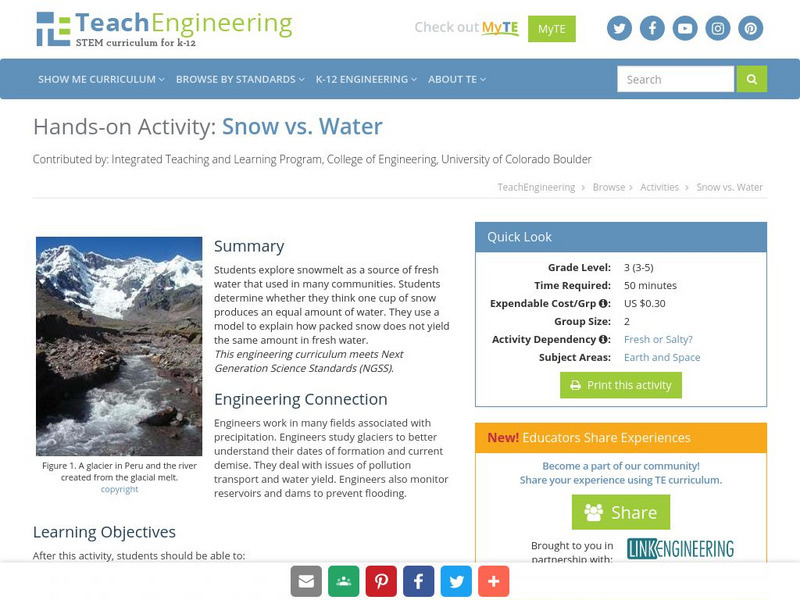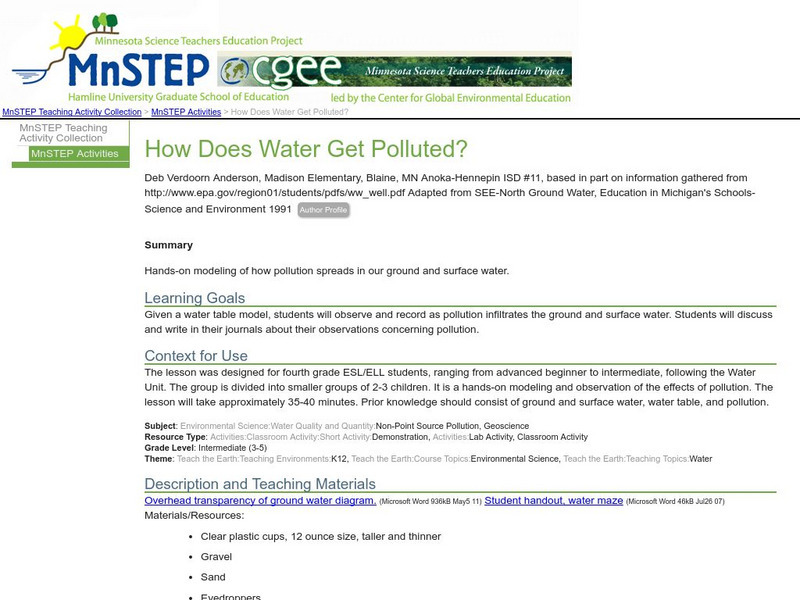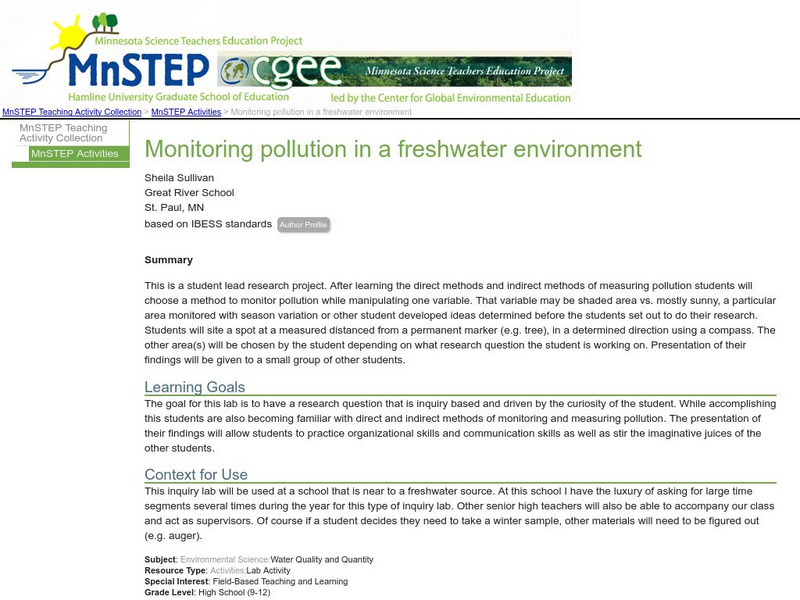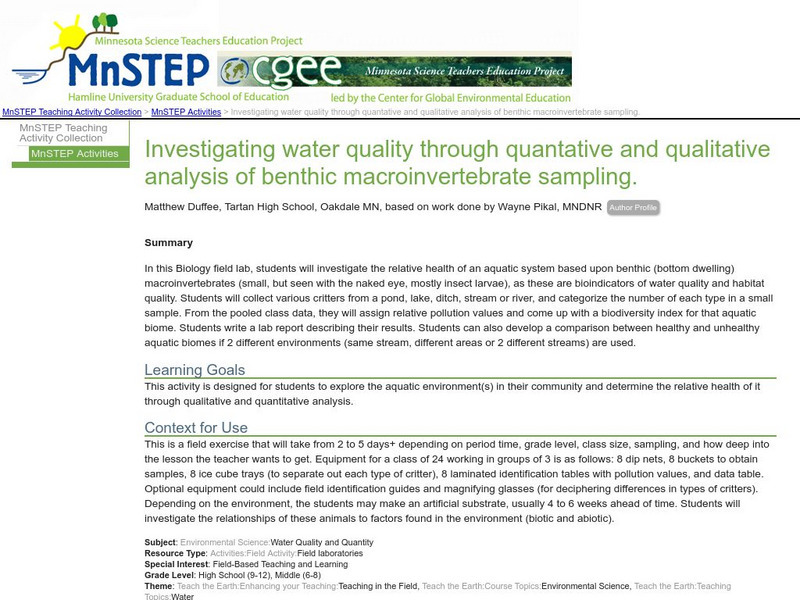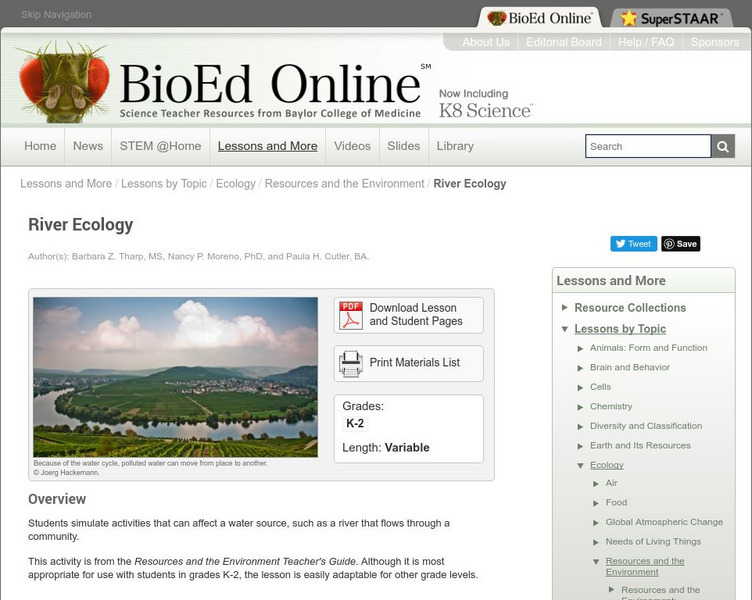Other
North Carolina Department of Energy and Natural Resources: Pollution Solutions
Try to find at least eight things in the picture that could cause litter, waste, or other pollutants to end up in the storm drain and eventually flow into nearby lakes and streams. Includes a link to an interactive page of this activity....
TeachEngineering
Teach Engineering: Snow vs. Water
Engineers work in many fields associated with precipitation. Engineers study glaciers to better understand their dates of formation and current demise. They deal with issues of pollution transport and water yield, and they monitor...
TeachEngineering
Teach Engineering: Splish, Splash, I Was Takin' a Bath!
In this instructional activity, learners will explore the causes of water pollution and its effects on the environment through the use of models and scientific investigation. In the accompanying activities, they will investigate...
TeachEngineering
Teach Engineering: What Happened to the Water? Designing Ways to Get and Clean
In this scenario-based activity, students design ways to either clean a water source or find a new water source, depending on given hypothetical family scenarios. They act as engineers to draw and write about what they could do to...
Science Education Resource Center at Carleton College
Serc: How Does Water Get Polluted?
Given a water table model, learners will observe and record as pollution infiltrates the ground and surface water.
Science Education Resource Center at Carleton College
Serc: Disasters to Nature: Sensitivity of Ground Water Systems to Pollution
Students visit three sites to investigate the areas where there is very high sensitivity for ground-water pollution. They also test the quality of water, measuring the dissolved oxygen, pH, total phosphate, nitrates, turbidity, and...
Science Education Resource Center at Carleton College
Serc: Monitoring Pollution in a Freshwater Environment
During this research project, students will choose either the direct method or the indirect method to monitor and measure pollution while manipulating one variable. They will develop a research question to work on and present their...
University of Arizona
Pulse: From Global to City Air: Air Quality, City Design and Disease
Learners are challenged to design a healthy city in this unit plan. The cross-curricular unit covers content standards for ninth grade in science, language arts, world geography, and math. Students explore air quality and the impact it...
Other
Fnal: Supplying Our Water Needs
A cross-curricular lesson working out needs of a town where fish are dying in the local waters, how can water be purified, how daily activities impact the water supply, and what role does chemistry play in the way individuals use water...
TeachEngineering
Teach Engineering: Grow Your Own Algae!
Students discover how tiny microscopic plants can remove nutrients from polluted water. They also learn how to engineer a system to remove pollutants faster and faster by changing the environment for the algae.
US Geological Survey
Lake Pontchartrain Basin Foundation: Liquid Assets: Our Water Resources
Lessons designed to show students how water quality, water pollution, and personal lifestyle are related. Lessons help students understand the importance of our water resources and water quality. Students will explore the nonpoint and...
HotChalk
Hot Chalk: Lesson Plans Page: Causes of Pollution
This lesson plan is designed to teach young children identify the types of pollution, the sources of the pollution, and how they can protect the environment from further pollutants.
TeachEngineering
Teach Engineering: Would You Drink That?
This activity focuses on getting students to think about bacteria, water quality and water treatment processes. Students develop and test their hypotheses about the "cleanliness" of three water samples prepared by the teacher. Then they...
Science Education Resource Center at Carleton College
Serc: Investigating Water Quality Through Quantative and Qualitative Analysis
By looking at the bottom dwelling macroinvertebrates, students will investigate water quality and habitat quality in this field lab. Students will record the number of creatures found at the bottom of a pond, lake, ditch, stream or river...
Science Education Resource Center at Carleton College
Serc: Investigating Aquatic Ecosystems: Macroinvertebrates and Water Quality
Young scholars will investigate three aquatic ecosystems (pond, stream, bog) to determine the relative pollution index and the water quality of each ecosystem. They will collect and analyze the benthic organisms found in each system and...
Science Education Resource Center at Carleton College
Serc: Healthy Waters
By the end of this lesson, young scholars will understand how we can use macroinvertebrates to determine the quality of water in a river or stream.
Government of Alberta
Alberta Environment: Focus on Groundwater: Groundwater Basics [Pdf]
This article explains in detail what groundwater is, why it is important, human activities that affect its quality and quantity, and things we can do to protect it.
Science Education Resource Center at Carleton College
Serc: Water Sheds and Water Quality
Included here is a collection of activities to teach students about watersheds and pollution.
abcteach
Abcteach: Earth Day Activities
[Free Registration/Login Required] How can you treat the earth with more respect? Check out this resource featuring links to elementary activities to celebrate Earth Day. You will find word searches, crossword puzzles, reading...
US Environmental Protection Agency
Epa: The Planet Protectors: Activities for Kids
Through this EPA resource, explore your environment and discover the animals, plants, air, and water around you. Learn how to protect the world we live in with fun games.
Science Education Resource Center at Carleton College
Serc: Mn Step: Water Runoff: How the Ground Water in Your Community Is Affected
After creating a model, students will investigate factors that affect water runoff both positively and negatively, and the impact this has on the quality of groundwater.
Texas Commission on Environmental Quality
Tceq: Lesson Plans & Resources for Teaching Environmental Sciences [Pdf]
A large collection of lesson plans on environmental topics. The lessons are broken up into the broad categories of air, water, and waste, and look at issues around quality, pollution, conservation, and recycling. There are activities for...
Nature Conservancy
The Nature Conservancy: Gardens Activity Guide: Water
In this guide helps students understand their garden as a model watershed through the collection and analysis of rainwater filtration data.[4.06]
BioEd Online
Bio Ed Online: River Ecology
In this lesson plan students are required to simulate activities that can affect a water source, such a river as it flows from one place to another within a community.



